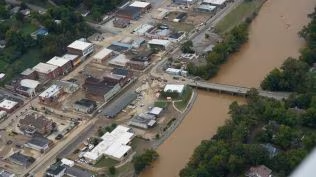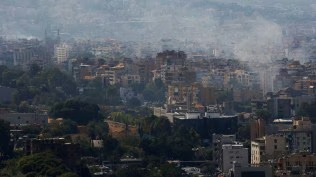Thousands of pagers exploding in Lebanon, Israeli airstrikes targeting Beirut, and Hassan Nasrallah being killed are a few incidents that have marked the last two weeks of deadly fighting between Israel and Hezbollah, further escalating tensions in the Middle East.
In just over a week, intensified Israeli strikes in Lebanon killed seven high-ranking commanders and officials from Hezbollah, including their leader, Nasrallah. While these attacks shocked Lebanon and much of the Middle East, Israeli officials hailed them as significant military and intelligence victories.

On Monday, Lebanon witnessed the first apparent Israeli airstrike on central Beirut in nearly a year.
Rockets fired, pagers explode
The Israel-Hezbollah conflict escalated significantly on October 8, 2023, a day after Hamas gunmen launched an unprecedented attack on Israel, triggering the war in Gaza. In solidarity with the Palestinians, Hezbollah began firing on Israeli positions.
Hezbollah and Hamas are allies and both consider themselves part of an Iran-backed ‘Axis of Resistance’ against Israel.
Since the escalation, Hezbollah has launched more than 8,000 rockets at northern Israel and the Israeli-occupied Golan Heights, according to a BBC report. They have also used anti-tank missiles and drones to attack military targets. In response, the Israel Defense Forces (IDF) retaliated with airstrikes, tanks, and artillery fire aimed at Hezbollah positions in Lebanon.
Tensions soared further after a rocket attack in the Golan Heights on July 27, 2024, killed 12 children and young people. While Israel blamed Hezbollah for the attack, the group denied any involvement.
Israel then targeted top Hezbollah commanders, including Fuad Shukur, who was killed in late July. Hours later, an explosion in Iran, widely attributed to Israel, killed Palestinian Hamas leader Ismail Haniyeh.
The conflict escalated again on September 17 and 18, when explosions involving pagers and walkie-talkies used by Hezbollah members killed 39 people and wounded thousands. On September 17, hundreds of pagers exploded almost simultaneously across Lebanon and Syria, killing at least 12 people, including two young children, and injuring thousands more.
Hezbollah and the Lebanese government blamed Israel for the explosions.
The following day, more detonations occurred in Beirut and other parts of Lebanon, killing at least 25 people and injuring over 600, according to Lebanon’s Health Ministry.
Afterwards, Israeli Defense Minister Yoav Gallant praised the military and security agencies but did not directly address the explosions, stating that Israel had entered “a new phase in the war”. Hassan Nasrallah, at the time, called the attack on the group’s communication devices a “severe blow” and warned that Israel had crossed a “red line”.
On September 20, Hezbollah suffered another setback when an Israeli airstrike on Beirut’s southern suburbs killed at least 16 people, including senior commanders Ibrahim Aqil and Ahmed Wahbi. Civilians, including children, were also among the casualties.
Two days later, Hezbollah retaliated by firing long-range rockets deep into Israel, forcing thousands of Israelis into bomb shelters and damaging homes near Haifa.
Hezbollah chief Hassan Nasrallah’s death
On September 27, Israeli airstrikes on Beirut killed Hassan Nasrallah. He had led Hezbollah for decades and was killed in a strike on the group’s central command headquarters in Beirut’s southern suburbs. Hezbollah confirmed his death and vowed to “continue the holy war against the enemy and in support of Palestine”, as reported by Al Jazeera. Israel’s military took responsibility for the operation.
After taking control of Hezbollah, Nasrallah had forged a strong alliance with Iran, which remains a key supporter of the group today. With substantial financial and political backing from Tehran, he had transformed Hezbollah into a powerful force and a major regional player.
Nasrallah effectively led a low-intensity war against Israel, which eventually forced Israel to withdraw its forces from southern Lebanon in 2000 after an 18-year occupation. He later hailed this as the first Arab victory against Israel. His death is a major blow to Iran’s influence in the region.
Hezbollah has not yet indicated who will succeed Nasrallah, although senior official Hashem Safieddine has long been seen as the likely heir. Meanwhile, a Reuters report says that Iran’s Supreme Leader Ayatollah Ali Khamenei has reportedly been moved to a secure location in Iran amid heightened security, following Israel’s strike on Hezbollah’s leadership.
How the rest of the world has responded
The White House continues to urge Israel and Hezbollah to agree to a 21-day temporary ceasefire proposed by the US, France, and other countries during last week’s UN General Assembly. White House National Security Spokesperson John Kirby stated that Israel would not be able to safely return people to their homes in northern Israel while waging an all-out war against Hezbollah or Iran.
China has called on “all parties involved, especially Israel”, to take immediate steps to de-escalate tensions and prevent the conflict in West Asia from spiralling out of control.
In a televised speech on Sunday, Lebanon’s caretaker Prime Minister Najib Mikati stated that the country had “no option but the diplomatic option” when asked about efforts to end Israel’s escalation against Hezbollah.
Saudi Arabia expressed its support for the Lebanese people in light of the current events, emphasising the need to preserve Lebanon’s sovereignty.
Death toll mounts, thousands displaced
Israeli airstrikes across large parts of Lebanon have killed over 1,030 people, including 156 women and 87 children, in less than two weeks, according to Lebanon’s Health Ministry. The strikes have displaced hundreds of thousands, with an estimated 250,000 people now in shelters, and many more staying with friends and relatives, or camping on the streets. According to a BBC report, over 70,000 people have been displaced by the fighting in northern Israel.
Disclaimer: The copyright of this article belongs to the original author. Reposting this article is solely for the purpose of information dissemination and does not constitute any investment advice. If there is any infringement, please contact us immediately. We will make corrections or deletions as necessary. Thank you.







